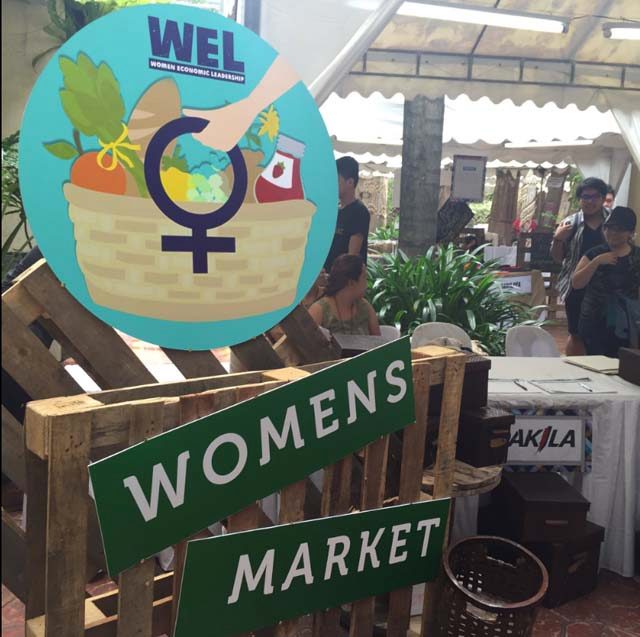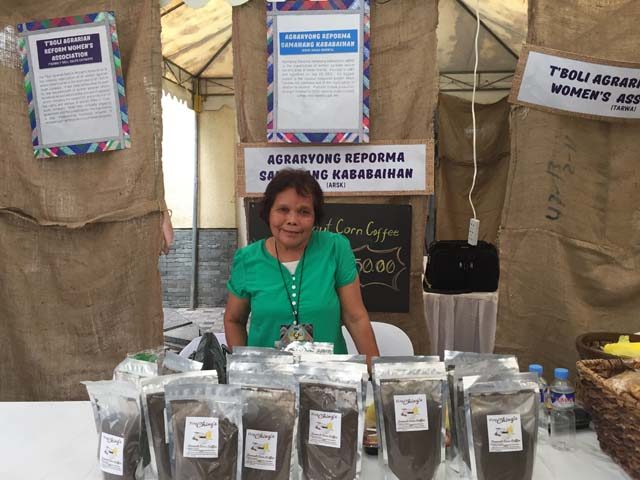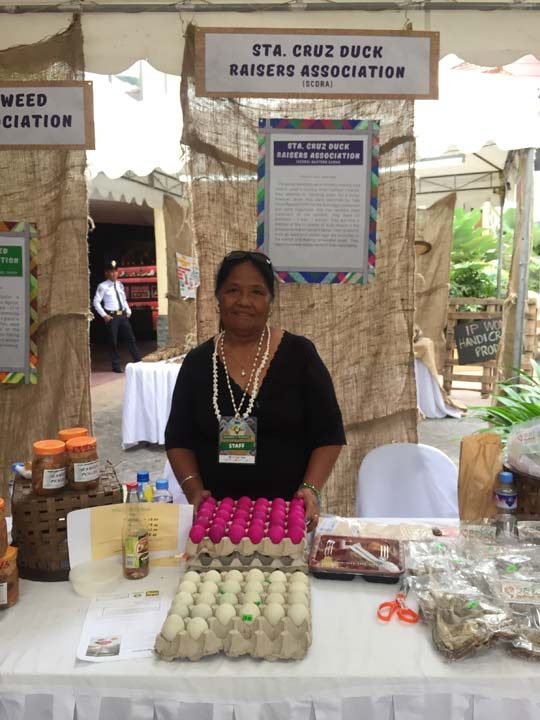SUMMARY
This is AI generated summarization, which may have errors. For context, always refer to the full article.

MANILA, Philippines – “Mare, hindi ka na lang pambahay ngayon…”
To celebrate International Day of Rural Women, Oxfam, Pambansang Koalisyon ng Kababihan sa Kanayunan (PKKK), and Dakila – Philippines Collective for Modern Heroism brought together women leaders and entrepreneurs, mostly from rural communities, at the Women’s Market on October 15, 2016 at the Eastwood City Walk 2.
A diverse selection of homegrown and handcrafted products such as banig, organic lechon, salted egg, and coffee were showcased in the one-day event. There was also a special program that featured guest speakers, performers, and a short documentary film.
One of the local entrepreneurs in the market was Conchita “Conching” Masin, a 72-year old proud farmer from Davao Oriental. She is the chair of Agraryong Reporma Samahang Kababaihan (ARSK) – a local group of women agrarian reform beneficiaries. The group sold home made products, one of which was the Nay Ching Coconut Corn Coffee, a drink made from grated coconut meat, corn grits, and coffee beans. Masin said it went through a lot of improvements until the formula was perfected.
Conching beamed with pride as she sold her coffee. “Nagkaroon ng patunay na ang kababaihan hindi lang empowered kundi [may] sariling patago na potential,” she said.(This is proof that women are not only empowered but have innate potential.)

Rural women
In the Philippines, rural women comprise 43% of the agricultural labor force. According to Oxfam, this means women are essential to ensuring food security. Oxfam adds that rural women need to be supported by the government and by the public. This will improve agricultural productivity and promote gender equality.
In an industry where the contribution of women is often downplayed, there is a need to provide venues to highlight their role and value in agricultural economies.
For Isabel Nepomuceno, participating in the Women’s Market is a big deal. Nepomuceno is a member of the Sta. Cruz Duck Raisers Association (SCDRA), which advocates sustainable livelihood and good community rapport.
“Nakakatulong din kasi nagkakaroon ng malawak na pag-iisip yung aking mga kasamahan tulad halimbawa nadadala sa ibang lugar yung produkto namin. So sila, nagsusumikap na ipagpatuloy,” she said. (It helps because my colleagues get to have a broader outlook by way of bringing our products to other places. So they continue to exert effort.) (Read: The women of Baruya: Invisible food producers)

A typhoon Yolanda survivor, Nepomuceno mentioned she was confronted by the question “Paano kami babangon?” (How will we rise?) after the tragedy. Along with some members of the community, she resorted to catching crab and raising ducks after the calamity washed out their coconut trees which she used to make nipa products. Like Conching, she is grateful that they had a venue like the Women’s Market to promote their products. (READ: The rural women’s wishlist)
To strengthen and connect
Women’s Market is an annual project by Oxfam, Dakila, and PKKK under the Women’s Economic Leadership Program that advocates for the empowerment of women.
Rebecca Miranda, the president of PKKK, believes that it is important to acknowledge the contribution of rural women in the development of their communities.
Justin Morgan, Oxfam Philippines country director said the event was also an opportunity for women to connect with each other. “Women come together and they connect with other women entrepreneurs. That in itself is often quite empowering and supporting because they know that they’re going through these things together,” said Morgan.
Morgan hopes the market will create long-term connections among the participants. He acknowledged all the participants and their hard work to put the market together. “The leadership and the ideas and the entrepreneurship solely come from the women that we’re here with today.”
Tweets about #FutureProof from:MovePH
//
Local women entrepreneurs like Conching and Isabela hope that local consumers will continue to support their cause and their products. With a determined look on her face, Conching appealed to the public: “matuto tayong mag-appreciate, mag-recognize ng sarili nating produkto.” (Let’s learn to appreciate and know our own products.) – Rappler.com
Denise Nacnac is a Rappler Intern and a student at the Ateneo de Manila University.
Add a comment
How does this make you feel?
There are no comments yet. Add your comment to start the conversation.